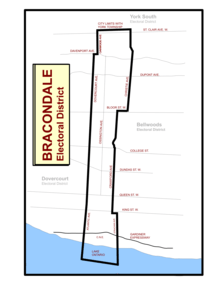Bracondale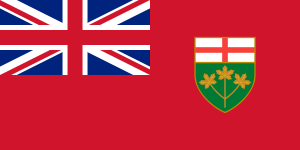 Ontario electoral district Ontario electoral district |
|---|
|
Bracondale electoral district as it appeared from 1934 until its abolition in 1967. |
| Defunct provincial electoral district |
|---|
| Legislature |
Legislative Assembly of Ontario |
|---|
| District created |
1925 |
|---|
| District abolished |
1967 |
|---|
| First contested |
1926 |
|---|
| Last contested |
1965 |
|---|
Bracondale was a provincial electoral district in Toronto, Ontario, Canada. It was represented in the Legislative Assembly of Ontario from 1926 to 1967. The constituency got its name from an old Toronto suburb called Bracondale, that was annexed by Toronto in 1909. Its most notable event was electing one of the first two women Members of the Provincial Parliament (MPP) to share the title "first-woman MPP" in 1943 when Rae Luckock was elected. In 1965, Bracondale's MPP, Joseph Gould, died in office sparking the final election held in the constituency. George Ben won the by-election, and became the constituency's last MPP. It was abolished for the 1967 Ontario provincial election, and redistributed into the Dovercourt and Bellwoods constituencies. As of 2012, the current electoral districts of Davenport, St. Paul's and Trinity–Spadina encompass this historic riding.[1]
History
Bracondale was the name of a former Toronto suburb that was annexed by the city in 1909;[2] and north of Davenport Road, constituted the northern part of what eventually became the provincial electoral district. It was part of the northwestern expansion of the city that included Wychwood Park, and the City of West Toronto (now known as The Junction).[2] The constituency was first contested during Ontario's 17th general election on 1 December 1926.[3] Arthur Russell Nesbitt, was elected its first Member of the Legislative Assembly (MLA).[4] He was a member of Ontario Conservative Party.[4]
The constituency's first Ontario Liberal MLA was Lionel Conacher, a famous Canadian athlete that retired from the National Hockey League to start a career in politics.[5] He was elected on 6 October 1937 in a very close race with the constituency's incumbent MLA, Nesbitt.[6] Nesbitt claimed that two ballot boxes were missing and one was filled with fraudulent ballots. [7] The constituency's returning officer was arrested, and denied bail because he had a quantity of ballots stuffed in his pockets.[7] Soon after Conacher was elected as an MLA, the legislature changed the designation for its members to Member of Provincial Parliament (MPP) in 1938.
Bracondale's most notable event came in 1943. Its residents elected Rae Luckock, one of two Co-operative Commonwealth Federation (CCF) female MPPs to share the title "first-female MPP"; the other was Agnes Macphail in York East.[8] Luckock lost the 4 June 1945 provincial election to Conservative Harry Hyland Hyndman, which saw the Conservatives sweep into a majority government, by gaining most of the extra seats from the CCF.[9]
Boundaries
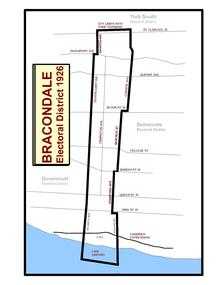
The original boundaries for Bracondale used for the 1926 and 1929 elections
1926 to 1934 boundaries
Bracondale was a long and narrow constituency, ranging from the Canadian National Exhibition Grounds in the south to the city limits at St. Clair Avenue in the north, in Toronto's west-end. It included parts of the present-day neighbourhoods of Bracondale Hill, Davenport, Dovercourt Park, Dufferin Grove, Little Portugal, and Liberty Village. Its southern boundary was Lake Ontario. Its eastern boundary started on the west side of Strachan Avenue. It went north on Strachan to Queen Street West and jogged westward along Queen's south side to Crawford Avenue. It then went north on Crawford's west side until Dundas Street West, where it went eastward along the northern section of Dundas to Beatrice Street. It went north on Beatrice's west side straight through to Bloor Street West. It then jogged east on Bloor's north side to Christie Avenue. It then went along Christie to the northern boundary, the city limits just north of St. Clair Avenue West. It jogged westward along the city limits to Oakwood Avenue. It then went south along Oakwood's eastside to Davenport Road. It then jogged along Davenport's south-side to Dovercourt Road. It then went south on Dovercourt's east-side to Atlantic Avenue. On Atlantic's east-side to Lake Ontario.[10][11]
1934 to 1967 Boundaries
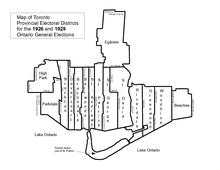
Bracondale in context with the other Toronto districts in 1926 and 1929.
Bracondale was a long and narrow constituency, ranging from the Canadian National Exhibition Grounds in the south to the city limits immediately north of St. Clair Avenue, in Toronto's west-end. It included parts of the present-day neighbourhoods that belong to Bracondale Hill, Davenport, Dovercourt Park, Dufferin Grove, Little Portugal, and Liberty Village. Its southern boundary was Lake Ontario. Its eastern boundary started on the west-side of Strachan Avenue. It went north on Strachan to Queen Street West and jogged westward along Queen's south side to Crawford Avenue. It then went north on Crawford's westside until Bloor Street West. It then jogged east on Bloor's north side to Christie Avenue. It then went along Christie to the northern boundary, the city limits just north of St. Clair Avenue West. It jogged westward along the city limits to Oakwood Avenue. It then went south along Oakwood's eastside to Davenport Road. It then jogged along Davenport's south-side to Dovercourt Road. It then went south on Dovercourt's east-side to Atlantic Avenue. On Atlantic's east-side to Lake Ontario.[10][11]
In 2012, the historic boundaries are approximately part of the south-east portion of the present-day Davenport constituency,[12] a portion of the southern section of St. Paul's constituency, [13] and most of the western portion of the Trinity–Spadina constituency.[14]
Members of Provincial Parliament
Election results
1920s
Ontario general election, 1926
|
Party |
Candidate |
Votes[16] |
Vote % |
|---|
| |
Conservative |
A.R Nesbitt |
10,483 |
69.4 |
| |
Prohibitionist |
A.W. Pike |
3,006 |
19.9 |
| |
Liberal |
F.H Wager |
1,610 |
10.7 |
| |
|
Total |
15,099 |
|
1930s
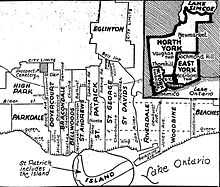
Toronto riding boundaries after 1934 redistribution
Ontario general election, 1934
|
Party |
Candidate |
Votes[18] |
Vote % |
|---|
| |
Conservative |
A.R. Nesbitt |
6,296 |
42.2 |
| |
Liberal |
E.C. Bogart |
5,803 |
38.9 |
| |
Cooperative-Commonwealth |
Rose Henderson |
2,412 |
16.2 |
| |
Communist |
Thomas C. Sims |
362 |
2.4 |
| |
Socialist-Labour |
William White |
32 |
0.2 |
|
|
Total |
|
|
Ontario general election, 1937
|
Party |
Candidate |
Votes[19] |
Vote % |
|---|
| |
Liberal |
Lionel Conacher |
7,575 |
45.6 |
| |
Conservative |
A.R. Nesbitt |
7,528 |
45.3 |
| |
Co-operative Commonwealth |
Murray Cotterill |
1,505 |
9.1 |
|
|
Total |
|
|
1940s
Ontario general election, 1943
|
Party |
Candidate |
Votes[20] |
Vote % |
|---|
| |
Co-operative Commonwealth |
Rae Luckock |
4,494 |
38.3 |
| |
Conservative |
H. Hyndman |
4,266 |
36.4 |
| |
Liberal |
E.C. Bogart |
2,685 |
22.9 |
| |
Independent-Soldier |
John Dymond |
283 |
2.4 |
|
|
Total |
|
|
Ontario general election, 1945
|
Party |
Candidate |
Votes[21] |
Vote % |
|---|
| |
Conservative |
H. Hyndman |
6,191 |
31.1 |
| |
Co-operative Commonwealth |
Rae Luckock |
4,863 |
24.4 |
| |
Liberal |
Lionel Conacher |
4,312 |
21.7 |
| |
Labour Progressive |
Leslie Morris |
4,221 |
21.2 |
| |
Independent-Conservative |
C.D. Graham |
314 |
1.6 |
|
|
Total |
19,901 |
|
Ontario general election, 1948
|
Party |
Candidate |
Votes[22] |
Vote % |
|---|
| |
Co-operative Commonwealth |
H. Walters |
7,980 |
44.8 |
| |
Conservative |
Fred Conboy |
6,828 |
38.3 |
| |
Liberal |
W. Alex Gunn |
2,998 |
16.8 |
|
|
Total |
|
|
1950s
Ontario general election, 1951
|
Party |
Candidate |
Votes[23] |
Vote % |
|---|
| |
Conservative |
Arthur Frost |
6,014 |
42.0 |
| |
Co-operative Commonwealth |
Harry Walters |
4,398 |
30.7 |
| |
Liberal |
Frank Mills |
3,900 |
27.2 |
|
|
Total |
14,312 |
|
Ontario general election, 1955
|
Party |
Candidate |
Votes[24] |
Vote % |
|---|
| |
Conservative |
Arthur Frost |
4,718 |
37.7 |
| |
Co-operative Commonwealth |
Tom Paton |
3,392 |
30.3 |
| |
Liberal |
George Ben |
2,985 |
26.7 |
| |
Labour-Progressive |
Harry Hunter |
584 |
5.2 |
|
|
Total |
11,679 |
|
Ontario general election, 1959
|
Party |
Candidate |
Votes[25] |
Vote % |
|---|
| |
Liberal |
Joseph M. Gould |
4,059 |
36.5 |
| |
Conservative |
Harold Menzies |
3,675 |
33.1 |
| |
Co-operative Commonwealth |
Jack Elchuk |
2,924 |
26.3 |
| |
Independent-Conservative |
Robert Martin |
453 |
4.1 |
|
|
Total |
11,111 |
|
1960s
Ontario general election, 1963
|
Party |
Candidate |
Votes[26] |
Vote % |
|---|
| |
Liberal |
Joseph M. Gould |
4,245 |
38.2 |
| |
Conservative |
Stanley Pronck |
4,197 |
37.8 |
| |
New Democrat |
Stan Matias |
2,669 |
24.0 |
|
|
Total |
11,111 |
|
By-election, 15 September 1965
|
Party |
Candidate |
Votes[27] |
Vote % |
|---|
| |
Liberal |
George Ben |
4,940 |
46.35 |
| |
New Democrat |
John Farnia |
3,486 |
32.71 |
| |
Conservative |
Lawerance Odette |
2,233 |
20.95 |
|
|
Total |
10,659 |
|
References
Notes
- ↑ Gould died in office 8 May 1965.
Citations
